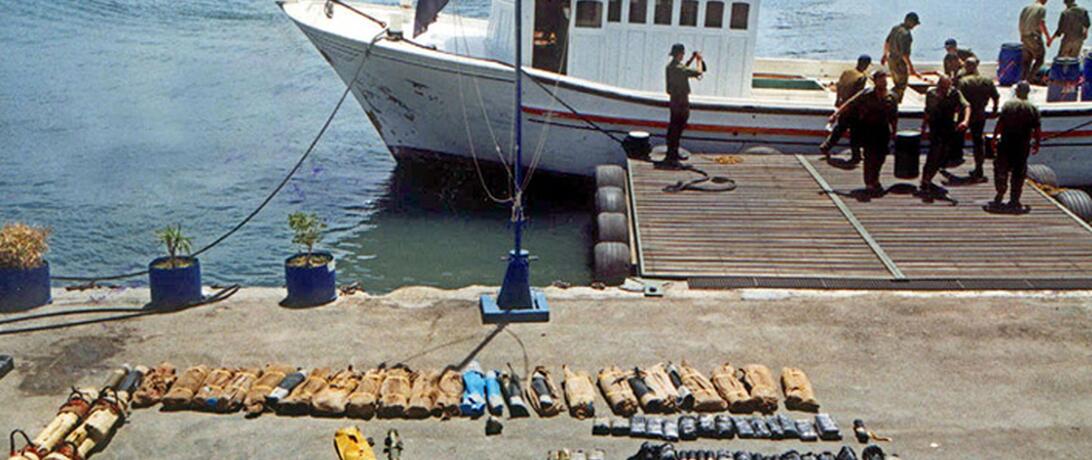
The Australian Navy confiscated an unlikely fishing haul in February, 2016: 2,000 AK-47s, 100 rocket-propelled grenade launchers, 49 machine guns and spare barrels, and 20 mortar tubes.
The Australian Navy confiscated an unlikely fishing haul in February, 2016: 2,000 AK-47s, 100 rocket-propelled grenade launchers, 49 machine guns and spare barrels, and 20 mortar tubes.
This arsenal was found hidden under fishing nets on an unregistered, stateless fishing vessel likely headed to Yemen or the Somali region. In March of this year, two more fishing vessels were discovered smuggling weapons off the Arabian Peninsula, indicating that suspicious fishing vessels might be hiding more than illegal, unreported, and unregulated (IUU) fish catches.
The causes of maritime crime include destabilizing factors common in the Western Indian Ocean region. Domestic catalysts of maritime crime include poverty, limited employment and economic options, overfishing, food insecurity, and government corruption. Increased competition for resources such as fish among regional countries can further aggravate food and economic insecurity, thereby making criminal activities an attractive option for quick income.
The recent incidents of weapons smuggling on fishing vessels highlight the connections and parallels between IUU fishing and organized crime, a dangerous relationship that not only exacerbates conflict over marine resources, but can result in the arming of violent regional actors like ISIS, Al-Shabaab and Yemeni rebels.
The Cycle of Conflict and Crime
The same insecurity issues facilitate weapons smuggling that facilitate IUU fishing, indicating a large-scale problem of regional governance both on land and at sea. Yemen and Somalia, the likely destinations for these weapons, share a lack of governance which opens the door for organized crime and smuggling. Yemen is embroiled in a civil conflict that has left it effectively stateless. The Somali region is more stable, but is still developing its governance structure and is under a constant threat of terrorist attack by Al-Shabaab. Both countries are stuck in a negative feedback loop. Conflict and instability on land disrupt their ability to focus on their maritime sectors and leave their waters unattended and ripe for IUU fishing and weapons smuggling operations. These maritime crimes deplete food resources and arm violent actors, increasing the conflict on land and perpetuating the lack of maritime governance.
The instability that diminishes oversight on the water also results in food and economic insecurity, making criminal activity an attractive livelihood option for citizens of conflict countries. In the cases of the three seized smuggling vessels, the weapons allegedly originated in Iran. Though the country’s government is considered relatively stable, Iranian citizens suffer from widespread poverty. Food scarcity and overfishing in their own waters have forced Iranians to look elsewhere for fish and profit.
In Somali waters, Iranian vessels are responsible for one third of the total fish caught by foreign vessels. Iranian fishers have a large, unsanctioned presence in Somali waters, providing the opportunity for smugglers to hide amongst fishers and slip by international naval patrols that pay little attention to fishing vessels. With the street value of the smuggled arsenal estimated at $2 million, the relatively low risk of being caught is justified by the potential reward.
International Shortcomings and Solutions
Though the recent weapon confiscations demonstrate the potential utility of maritime security strategies in the region, patrols by international navies are not enough to stop these crimes at sea. For every weapon-laden fishing vessel caught, it is probable that many others are escaping detection and successfully distributing weapons in conflict zones. Internationally, the loopholes that allow IUU fish to enter the global marketplace are the same as those that perpetuate the weapons smuggling that arms dangerous insurgents and terrorist groups.
The biggest obstacle is that fishing vessels, especially small wooden dhows like those used in the recent incidents, are not required to have identification numbers or satellite tracking devices. While the capacity for monitoring, control, and surveillance of fishing vessels in the Western Indian Ocean is increasing, it is still weak. Improving this capacity would allow regional countries to better monitor suspicious vessels.
Another challenge is a lack of enforcement and prosecution jurisdiction. On the high seas, under the United Nations Convention on the Law of the Sea (UNCLOS) and the Arms Embargo in place since 1992, international navies are sanctioned to inspect unregistered vessels and seize illegal weapons caches heading toward Somalia. However, the vessel operators and crew cannot be prosecuted because in the ungoverned waters of the high seas, they are not subject to any countries’ laws. Therefore, if and when they are caught, the people and the vessels involved must be released and can continue their illicit activities without consequence.
One solution to stop the flow of both IUU fish and weapons would be the entry into force of the United Nations Port State Measures Agreement (PSMA). Primarily geared toward stopping IUU fishing, the agreement gives port states the power to inspect fishing vessels. If a vessel is suspected of carrying IUU fish, it can be blocked from entering port. This prevents the vessel from offloading its catch and selling the IUU fish, thus reducing the incentive to fish illegally. The PSMA would increase scrutiny of fishing vessels that may be illicit, but currently have a low risk of being searched. More searches would in turn improve the chances of catching illegal smuggling operations and stopping the flow of arms to militants. The PSMA is poised for passage, with only one more signatory needed.
Closing the loopholes for fishing vessels and high seas crime is a crucial step to stop all maritime crimes on the international level. However, these crimes can only be prevented by directly addressing the problems within unstable countries. Until regional conflicts are resolved and Western Indian Ocean countries are stable enough to make maritime security a priority, there will be criminals at sea hiding guns under their fishing nets.
Article Details
Published
Topic
Program
Content Type
Opinion & Insights